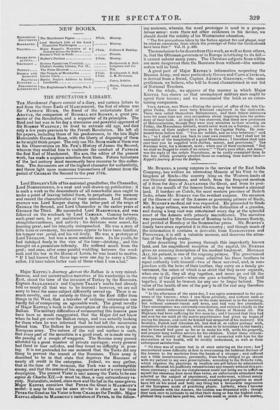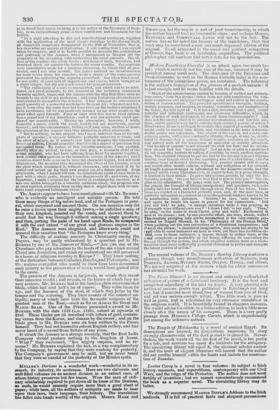Mr. BURNES, a young surgeon in the service of the
East India Company, has written an interesting Memoir of his Visit to the
kingdom of Sinde—the country lying on the Western limits of
our Oriental dominions, and which, from the frequent mention of it from the days of ALEXANDER the Great, and from its posi-
tion at the mouth of the famous Indus, may be termed a classical
land. It borders on Cutch, the most western province of British India, where Mr. BURNES was the resident surgeon. On occasion
of the illness of one of the Ameers or governing princes of Sinde,.
Mr. BURNES'S medical aid was requested. He proceeded to Sinde with a large retinue, was treated with the distinction of a grandee, and during a long visit was entertained every day at the splendid court of ihe Ameers with princely magnificence. The narrative was presented by the Governor of Bombay to the Literary Society, and printed at Bombay at the Sumrnachar press. Mr. BURNES.S• family have since reprinted it in this country ; and though much of the information it contains is derivable from ELPHINSTONE and POTTINGER, it is still a valuable memoir, and deserves the atten- tion of the English reader.
After describing his journey through this imperfectly known land, and his magnificent reception at the capital, Mr. BURNES gives an amusing description of his medical treatment. MotntAn Am, his patient, is one of the reigning princes. The government of Sinde is .unique : a late prince admitted his three brothers to equal authority with himself—two of these survived, and, in con- junction with the heirs of their brother, they carry on a family go- vernment, the union of which is so strict that they never separate, when one is ill, they all stay together, and never gO out till the recovery of the patient—when one goes a-hunting, they all hold together, it would be treason for any one to linger behind. The value of the health of one of the party to all the rest may therefore be well conceived.
" In the afternoon of the same day, I was again summoned to the pre- sence of the kmeers ; when I saw them privately, and without state or parade. They were dressed nearly in the same manner as in the morning, but without cummer-bunds and arms, and had very few attendants.. Their conversation was extremely conciliatery, and referred chiefly to the subject which interested them most, the illness of Mourad Ali. His Highness had been suffering for five months ; and I learned that they had not sent for me until all the native practitioners had given up hopes of curing his disease, and until he himself had despaired of his recovery. His brothers, Futteh and Ghoolam Ali, had died of, or rather perhaps with, complaints of a similar nature, which seem to be hereditary in the family; and he himself had gone so far as to make his will, settle his property,. and prepare long written advices for his children. Under these circum- stances, the anxiety of Mourad Ali and all connected with him for the restoration of his health, will be readily understood, as well as their subsequent satisfaction.
"No time was of course lost in at once entering on the cure ; but 1, encountered some difficulty at first in overcoming the habitual distrust ol the Ameers to try medicine from the .hands of a stranger ; and suffered not a little inconvenience, personally, from being obliged to go shares. with my patient in my own prescriptions, according to the Beloche rule, which requires the physician to swallow one pill before he administers another. Mourad Ali posttively refused to take any remedy without this pre- vious ceremony ; and as my complaisance could not bring me to inflict oa myself the nauseous dose more than twice, an unfortunate attendant was selected as the subject of experiment, and underwent, without mercy or necessity, such al course of 'continued sweating's:rid purgation as rriuSt have left on his mind and body any thing but a favourable impression of the European mode of practising physic. Latterly, when I became more intimate with the Ameers, the custom was dispensed with ; though they took care to intimate to me that their doing so was the highest com- pliment they could have paid me, and even made so Much of the Matter,.
as to direct their envoy to bring it to the notice of the Governor of Bom- bay, as an extraordinary proof of their confidence and friendship for the British.
" By a rigid attention to diet and constitutional treatment, together with the application of the most simple dressings to the disease itself, all dangerous symptoms disappeared by the 20th of November, that is, ten days after my arrival at Hyderabad. I will confess that I was myself taken by surprise; and it is hardly possible to describe the gratification and gratitude of the Ameers, when I announced to Mourad All the propriety of his resuming with moderation his usual pursuits. The ill- ness of one confines the whole family ; and none of them, therefore, had breathed fresh air outside the fortress for many months. Preparations were immediately made for a hunting excursion, to which they all pro- ceeded, and I was also invited. The Amcor suffered no inconvenience for some weeks from his disorder ; while a dread of the consequences prevented his neglecting the regimen prescribed. But when this ceased, he was guilty of some acts of imprudence and excess, which brought on a slight relapse, but did not much retard his general recovery.
"The suddenness of a cure so unexpected, and which was to be attri- buted, in a great measure, to the removal of the irritating substances formerly applied, impressed the Ameers with the idea that there were no bounds to my skill in my profession ; and some fortuitous circumstances contributed to strengthen the delusion. I had occasion to administer a small quantity of a powerful medicine to Mourad Ali ; who declined tak- ing it even after the same dose had been tried on the luckless attendant I have mentioned, till lie was positively assured by me what would be the exact effect upon himself. I saw at once that this was in their estima- tion a grand test of my knowledge ; and it was one certainly which per- plexed me considerably. Having no alternative, however, I boldly hazarded .a guess, which the event, luckily for my reputation, proved correct ; and this circumstance, trifling as it may seem, excited so much the attention of the Anicers that they alluded to it often afterwards.
" But to nothing, in this respect, was I more indebted than to the sul- phate of quinine ; a remedy hitherto perfectly unknown in Sinde, and the effect ofwbich, as it scarcely ever fails in stopping the intermittent fevers of natives, Uctiuld generally foretel with a degree of precision that astonialted them. By means of this valuable medicine, I was enabled, shortly after my arrival, to cure, in two days, a favourite child of the prime minister, who had been suffering from fever for months together, with several otherpersons in the immediate service of the Ameers; and I would no doubt have gone on to raise my character higher, had not their Highnesses, the moment they discovered the effect of the quinine, seized the phial which contained it, without ceremony, and ordered it to be sealed and locked up for their own proper use at a future period. Even afterwards, when I myself fell sick, no solicitations could induce them to part with a single grain, though I was dangerously ill ; and when, at my departure, I made a request for the bottle in exchange for another, as it was one which belonged to a valuable medicine-chest, the proposal was at once rejected, evidently from an idea that it might share with its con- tents some supposed talismanic virtue."
The Arneers appear to have been much pleased with Mr. BURNES who is evidently an intelligent and amiable person. He told them many things of hi 4 native land, and of the Feringees in gene- ral, which surprised and amused them. On one occasion only did he raise a frown upon their mighty brows,—he unfolded a map of their own kingdom, pointed out the roads, and showed them he could find his way through it without asking a single question; and then, putting the palm of his hand upon Sinde, he Compared it with the vast extent "of our great and glorious empire in the East." The Ameers were chagrined, and afterwards could not conceal their vexation that "the Feringees know every thing." The difficulty of making converts to Christianity among the Pagans, may be partly understood by a question put to Mr. BURNES by one of the Ameers of Sinde,—" Are you one of the Christians who pay adoration to the hoofs of the ass which carried Christ into Jerusalem, and which we understand are still preserved in a house of religious worship in Europe ? " They know nothing of the distinction between Catholics, Greeks,:and Protestants ; and the zealous evangelist who would in their faces have denounced such idolatry as the preservation of relics,- would have gained little to the cause.
The passion of the Ameers is for jewels, in which they invest their immense wealth ; and swords, in the blades of which they are very curious. Mr. BURNES had in his hands a plain unornamented blade, which had cost half a lac of rupees. They value them for age, and the fineness of the steel, of which they judge by the temper and the watering. They have swords of the remotest an- tiquity, many of which have been the favourite weapons of the greatest men of the East,—such as Situ ABBAS the Great and NADIR SHAH, One of the Princes presented a sword to Mr. BURNES, with the date 1122 (A.D. 1708), valued at upwards of 250/. These blades are all inscribed with letters of gold, contain- ing verses from the Koran, and stanzas by the owner ; and on the blade given to Mr. BURNES were six lines written by the Prince himself. They had not learned to esteem English cutlery, and had never heard of a sword from Britain of any price. It struck the Ameers as a strange anomaly, that the East India Company should produce nothing to the kingdom at home. "What!" they exclaimed, "five mighty empires, and no re- venue!" Mr. BURNES explained the fact, in a way complimentary to the Company, by saying that they were working for posterity. The Company's government may be mild, but we never heard that they were so careful of the posterity of the Hindoo ryots.



























 Previous page
Previous page